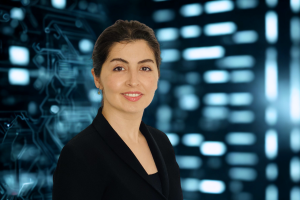As quantum computing inches closer to commercial applications, the race for quantum cybersecurity is on. Alumni start-up LuxQuantum is working on a solution for the compatibility between traditional and quantum cybersecurity tools, paving the way for secure communication in the future.
Currently, using technology from different vendors often makes it difficult (or even impossible) for systems to communicate securely with one another. The issue behind it is quite straightforward: there is no standardisation in quantum security solutions. This creates a major challenge that IT experts call “secure interoperability”, a gap that LuxQuantum aims to fill.
The time to act is now
The entrepreneurs stress that the time to act is now, as quantum computers may become a reality very soon. “Sensitive data can be harvested now and decrypted later, once powerful enough quantum computers exist”, explains Samira Chaychi. She emphasises the need to secure sensitive data such as defence, medical, or financial records now, so it does not become vulnerable later.
Compatibility through a new hybrid solution
Co-founders Samira Chaychi, a computer scientist, and Sharif Shahini, a physicist, met while completing their doctorates at the University of Luxembourg. It is here that they discovered the issue of interoperability, and they swiftly realised the enormous potential of a solution to this hurdle.
LuxQuantum aims precisely to develop an interoperability tool, by exploring hybrid approaches between traditional and quantum cybersecurity tools. The classical solution – Post-Quantum Cryptography (PQC) – is easier to integrate into current infrastructure. However, it has not yet been tested against real quantum computers, making its long-term effectiveness uncertain. In contrast, Quantum Key Distribution (QKD) uses quantum mechanics to detect attacks and offers unconditional security. But, it remains expensive, complex to operate, and difficult to scale.
By enhancing the compatibility between these technologies from different vendors, LuxQuantum’s proposed solution could enable secure communication regardless of the underlying technology.
In quantum, you’re in it for the long run
Like many start-ups in the quantum space, LuxQuantum is playing a long game. A technical feasibility study is currently being carried out, funded by Luxembourg’s Ministry of the Economy. Over the next years, the team will conduct industrial research, assess the usability of their solution in Luxembourg and other EU countries, and launch product development. The cup at the end of this journey will be a market pilot.
This is primarily a research-driven project, but it also has a strong technological component,” notes Samira. The Luxembourg Quantum Strategy foresees quantum as one of the country’s three strategic priorities, opening numerous opportunities.
‟ There are already some stakeholders involved in quantum security in Luxembourg, and we’d love to collaborate with them moving forward.”
Transitioning from a business idea to a viable solution
While their research backgrounds helped them to work on the technology, Samira notes that they had to acquire entrepreneurial knowledge in order to develop a viable business. The University of Luxembourg Incubator gave them access to various workshops and valuable information regarding insurance and legal questions, as well as an address for their start-up company during the first year.
Perhaps most importantly, they gained the confidence to move forward in the competitive start-up ecoysystem. “The PhD taught me to focus on problems and work independently. But after my PhD, I started learning how to become an entrepreneur – the University Incubator provided us with the tools to take this next step,” she explains. LuxQuantum is now hosted at Technoport incubator.
Their advice to future entrepreneurs?
“Networking is key.” Samira continues, “Luxembourg’s start-up ecosystem includes many partners such as Luxinnovation, the Chamber of Commerce, the House of Cybersecurity… The University and incubators host many events where students, researchers, and start-ups connect with industry professionals. If you’re just studying or doing research without showing up in these spaces, it’s hard to move forward. Being present and sharing your ideas—that’s how you start making your ideas reality.”
Upcoming Quantum Breakfasts
 Thursday 10 JulyConferences, Free of charge, In-person event, Series
Thursday 10 JulyConferences, Free of charge, In-person event, SeriesQuantum Breakfast: are you ready for Quantum Communications?
Learn more Thursday 18 SeptemberConferences, Free of charge, In-person event, Series
Thursday 18 SeptemberConferences, Free of charge, In-person event, SeriesQuantum Breakfast: are you ready for Quantum Computing?
Learn more Thursday 23 OctoberConferences, Free of charge, In-person event, Series
Thursday 23 OctoberConferences, Free of charge, In-person event, SeriesQuantum Breakfast: are you ready for Quantum Cryptography?
Learn more
